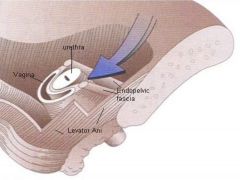![]()
![]()
![]()
Use LEFT and RIGHT arrow keys to navigate between flashcards;
Use UP and DOWN arrow keys to flip the card;
H to show hint;
A reads text to speech;
10 Cards in this Set
- Front
- Back
|
pelvic viscera supports
|
primarily: pubococcygeus, iliococcygeus, puborectalis
secondarily: endopelvic fascia lastly: urogenital diaphragm |
|
|
blood supply and innervation of supporting muscles
|
inferior gluteal a.
pudendal nerve (somatic & PSNS) pelvic splanchnic plexus (SNS) |
|
|
causes of prolapse & incontinence
|
damage to vasculature, nerves, muscles (vaginal delivery, constipation, heavy lifting, surgery)
*prolapse may occur years after initial insult |
|
|
Types of prolapse
|
anterior compartment - cystocele (dropped bladder)
mid-compartment - uterine prolapse, vaginal prolapse, enterocele posterior compartment - enterocele, rectocele |
|
|
Prolapse interventions
|
Pessary - intravaginal deviceusing the
bony pelvis and muscles for support Surgery |
|
|
how pee stays in
|

"hammock-like structure
circular and longitudinal smooth and striated muscle |
|
|
Types of Incontinence
|
Stress - failure of normal mechanism (denervation and devascularization)
Urge - disruption of normal voiding mechanism (neural pathways) Mixed Overflow - complete denervation of the bladder |
|
|
Stress incontinence causes & txs
|
anything that will damage muscle, fascia, devervate, devascularize (see prolapse causes)
tx: muscle exercises, surgery |
|
|
Urge Incontinence causes & txs
|
any interruption of neural pathway up and down the spinal cord (suprapontine lesions, pontine lesions, spinal cord lesions, sup sacral lesions)
Tx: retrain pathways, muscarinic blockade at the level of the detrusor |
|
|
Overflow incontinence causes & txs
|
complete denervation fo the bladder (DM, surgery, medications)
tx: self-catheterization |

